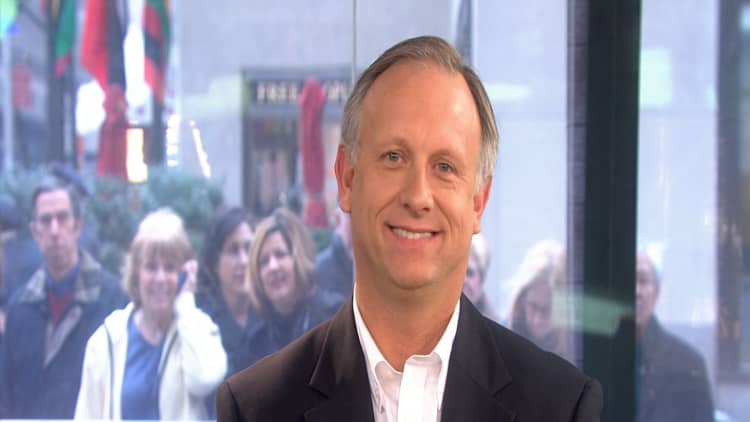Oz Pearlman isn't a psychic, but he can read minds. He left his Wall Street job at Merrill Lynch to become a professional magician and mentalist in 2005, going on to gain fame as a contestant on NBC's "America's Got Talent" in 2015. Now Pearlman, 36, does as many as 150 live shows a year, performing in front of "tens of thousands" of people and earning anywhere from $15,000 to $40,000 per event, he says.
As a mentalist, he seemingly reads a stranger's thoughts or impossibly guesses complex information.
For example, in a 2016 appearance on NBC's "The Today Show," Pearlman guessed the name of someone John Cena planned to talk to later that week, leaving the professional wrestler more than a little unsettled. Cena threw a stack of papers at Pearlman after seeing the person's name, "Vince," scrawled on his wrist. (Of course, it's no secret Cena's boss is WWE CEO Vince McMahon.)
So how does he do it?
"A huge part of my show [is] very simple. It's listening," Pearlman tells CNBC Make It.
And the average person can hone certain "soft skills" to improve their own abilities to read people and win them over, says Pearlman.
"A lot of the stuff I can teach is based on body language, diffusing tension, making people like you," he says.
Pearlman says keen observation can work for the average person who is trying to simply to pick up on what someone else is thinking or sway another's opinion in an everyday situation, like at work.
"So much of what people do when they're having a conversation with someone else is that they're thinking, while they're hearing, of what they're going to say next. So, you're not actually listening…" he says. "So, if you can, find a way to learn to turn your mind off in that moment and really listen."
Pearlman also advises keeping conversations fairly one-sided, with the focus on the other person, because "that's when you're going to glean things that are very useful."
For example, you might be able to surmise your boss's true opinion on a particular subject or work project, based on speech pattern cues. If your boss's speech picks up a notable amount of energy when discussing a certain project — as opposed to pausing, or circling around the topic — then it's safe to bet that's a project you should focus on.
Listening can also help you ingratiate yourself to the other person, which Pearlman says is important when it comes to influencing people.
"Take people's barriers down," Pearlman says.
To that end, he recommends repeating the person's name back to them in the form of a compliment, showing them that you are listening while also helping warm them up to you even more. "Tell them something nice… 'I love your earrings, Caitlin,'" he says.
Pearlman also talks about the importance of assessing "body language and tension." He says he learned a lot about "body language [and] people's responses and how to ingratiate yourself" from Dale Carnegie's famous book, "How to Win Friends and Influence People."
For instance, if he's guessing the identity of someone you're thinking of, he might call them "him or her" and then determine whether the answer is a male or female based on your body language when he says each word. In other cases, Pearlman asks a subject to pick a word from a magazine and he then watches their lips move silently while they select a word, effectively giving him the answer.
Analyzing body language can also come in handy in everyday life, like when a coworker you're talking to touches their face or lips during a conversation, it can mean they're not being entirely truthful or they simply don't agree with what you're saying.
"You start analyzing, 'Why do people do what they do? Are they predictable?'" Pearlman says. "Then you start to figure out trends."
Pearlman also uses subtle tricks to influence his subjects, such as slipping words or phrases into casual conversation in order to plant an idea in someone's head. (In a 2016 appearance on "The Today Show," he employed that trick, sneakily planting the idea of Taylor Swift into host Al Roker's mind by using the phrase "shake it off," a reference to the singer's song of the same name.)

So, the next time you're trying to win over your boss or a coworker to your side of an argument, it might be helpful to drop subtle hints and references — like casually mentioning how caffeine can boost mental performance in the hopes that your colleague will be inspired to go on a coffee run — to plant an idea in their heads that they'll think was actually theirs.
Of course, for Pearlman, these tricks are all part of getting his audience to warm up to him, easing any wariness they might have about a stranger seemingly pulling personal information about them out of thin air.
"I need to make them feel comfortable, like I'm accessible, like I'm relatable, and that I have a skill that's not scary or creepy," he says, "but it's something that if they committed 20 years of their life to do, they might be able to do as well."
Don't Miss:
5 ways mentally strong people set themselves up for success
The No. 1 thing mentally strong parents do to make sure their kids succeed
Like this story? Like CNBC Make It on Facebook!


